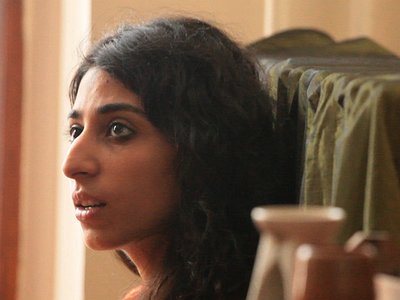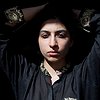Part 1
Name: Arooj Aftab
Nationality: Pakistani
Occupation: Composer
Current Release: Vulture Prince is out 4/23 on New Amsterdam
Recommendations: Sita Under the Crescent Moon by Annie Ali Khan / Secretly Happy by John Hassel
Arooj has a Bandcamp page where you can listen to and buy her music.
When did you start composing - and what or who were your early passions and influences? What was it about music and/or sound that drew you to it?
The earliest I can remember is when I was maybe 9 or 10, making up my own melodies and singing them around the house or for guests and people asking where they could hear that song or what it was. Later, as a teen I started composing in a singer/songwriter fashion with my guitar, sometimes in Urdu, sometimes in English, pretty cheesy stuff but hey it had to start somewhere. I’ve been surrounded by a lot of music from a very young age, and I guess what’s interesting to me now is that I never thought it was unusual to be creating my own music all the while.
For most artists, originality is preceded by a phase of learning and, often, emulating others. What was this like for you: How would you describe your own development as an artist and the transition towards your own voice?
Yes, definitely the phases of learning are super vital for growth and originality. I did the usual things in high school like play U2 and Seven Nation Army covers, but I’d also spend a lot of alone time listening to music like Zakir Hussain, Ella Fitzgerald, Abida Parveen and Leonard Cohen very deeply. When I began studying at music college, this practice became even more intense, as did my scope for what kind of music is out there. My control over music as a language also grew, but mostly only in the jazz idiom. I listened deeply for many years, with a sort of experimental pop project going on along side. I didn’t like when my voice was compared to other singers like Sarah McLaughlin or Sade. But I was aware of the fact that my sound was a work in progress. I continued my listening practice and I also kept collaborating with a lot of different types of musicians, from all over the world. I think a combination of all that, and just time itself, gives me the feeling (sometimes) that all the pieces are in place and the thing sounds pretty good.
How do you feel your sense of identity influences your creativity?
I think my obsession with things like displacement, reinvention, exile, chaos, feminism and just like, the maddening fabric of love and loss and tragedy in the world really, really influences how I sing, what instrumentation I choose, how I need the music to ebb and flow, and what poetry and prose I pick to go with it.
What were your main creative challenges in the beginning and how have they changed over time?
For me, it’s being a producer and a composer who doesn’t really play an instrument and is known mostly as a singer, and just walking into a room and having to overcome the shit show that it takes to being taken seriously. I now have the privilege of working with people I trust and respect, and to some degree have proven my worth, so it doesn’t happen as often but still. It does.
Time is a variable only seldom discussed within the context of contemporary composition. Can you tell me a bit about your perspective on time in relation to a composition and what role it plays in your work?
I personally like to take time. Like I said earlier, there is a long incubation period I go through when I have a new concept. This can involve deep listening, researching prose, drinking profusely for no reason, all sorts of activities linked to the vibe I know I need to reach. Then I like to write it, and then play it live in different collaborative configurations for a year maybe. I take a lot of time, basically. Of course, if it’s a commissioned piece I can bang it out, but where I can, I love to take time with the writing.
How do you see the relationship between the 'sound' aspects of music and the 'composition' aspects? How do you work with sound and timbre to meet certain production ideas and in which way can certain sounds already take on compositional qualities?
Writing the sound is the fun part! The colors and the textures, the little dynamic variations, things like one instrument completing the other instrument’s phrases… I love music that repeats and when layers behave in a super cylindrical or cyclic way, without really “playing parts” or “writing lines”; it’s the sound. That’s the sound doing that. When you write like a trumpet accompanied by a large clay pot percussion thing, and it’s like oh god that doesn’t go together at all… but the sound is so great so you make the whole thing really quiet and put it in the back of the mix… I love sound. What you compose can be really good but also really basic if you don’t have great sound ideas.
Collaborations can take on many forms. What role do they play in your approach and what are your preferred ways of engaging with other creatives?
I don’t think I can work alone at all. I need to workshop stuff, I need to hear the parts played to me by the person, their energy, their own personal taste or swag. The melodic structure of the music I write is never up for discussion, but the harmonic parts are very open. It’s inspiring to work with people. I don’t like bringing in fully fleshed-out charts and just saying “ok read this and count the bars and let’s hit record.”






